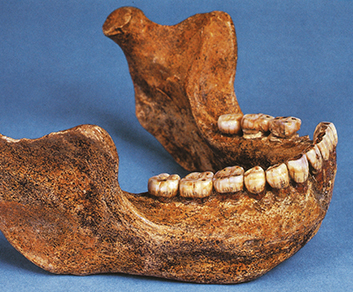History
Celts, Romans, Alemanns

Even in the earliest days of humankind, the area around the Rhine and Neckar must have been blessed by nature. What else can account for its very early settlement? The earliest proof of human existence can be found here: the approximately 600,000 year old Palaenthoropus lower jaw of „homo heidelbergensis“, discovered in 1907 in a sand pit in the parish of Mauer.

Millennia later, the Neolithic Age brought agriculture and animal husbandry to the Rhine-Neckar region. Traces of this culture and the subsequent Bronze Age can still be found in excavations today.
In the middle of the first century AD, the Romans crossed the Rhine and rang in a new epoch. They found an area where the Celts, who had settled there for a good 1000 years, had been forced to flee westwards and southwards over the Rhine by the approaching Germanic peoples, in particular the Suebi.
Former Celtic settlements became garrison towns such as Ladenburg (Roman: Lopodunum). The rule of the Romans, and their flourishing trade, lasted around 200 years, before the Alemannic tribes breached the Limes.
Around 500 AD, the Franks, led by their King Chlodwig, ultimately defeated the Alemanns and took control of the lower Neckar area. The rule of the Franks also brought Christianity to the region.
In the 12th century, the Electorate of the Rhine Palatinate grew out of the individual protectorates. The Counts Palatine held high offices and gained electoral dignity, that is, the right to elect the German King.
The region around the Rhine and Neckar suffered terrible destruction during the Thirty Years‘ War. The people had just four decades to reconstruct the area, before another atrocity befell the region at the end of the 17th century: The Palatinate War of Succession, in which Heidelberg‘s castle and university also went up in flames.
The years of war were followed by a century-long if dubious heyday. Wasteful Electors Palatine spent vast sums on sumptuous palaces, magnificent buildings and grand hunts. While arts and science were promoted to previously unknown extent, the people were so poor that they departed in droves. The Electoral Palatinate came to an abrupt end with Napoleon‘s meteoric rise.


